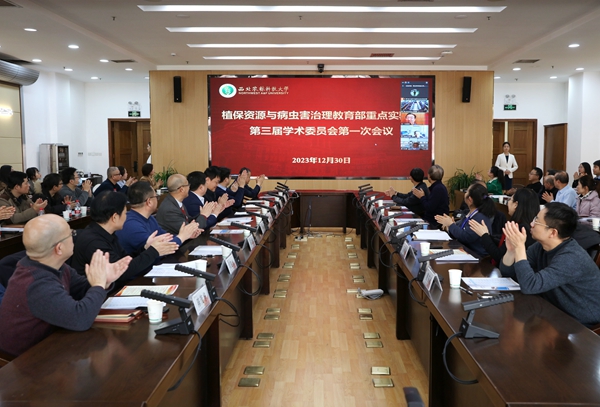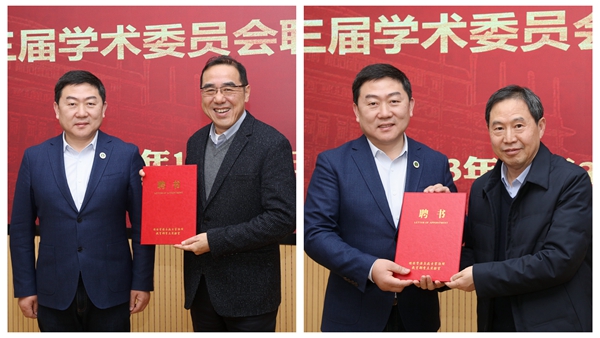In order to improve the function of the laboratory, promote the development of plant protection disciplines, and better serve national strategies, on December 30th, 2023, the first meeting of the third academic committee of the Key Laboratory of the Ministry of Education in Plant Resources and Pest Management was held at our college.

Academician Chen Jianping from Ningbo University, Academician Kang Le from Hebei University, Academician Kang Zhensheng from Northwest A&F University, and Research Scientist Zhang Youjun, head of the Institute of Vegetables and Flowers of the Chinese Academy of Agricultural Sciences, Research Scientist Qiao Gexia, head of the Institute of Zoology of the Chinese Academy of Sciences, Professor Zhang Yalin from Northwest A&F University, Professor Sun Wenxian from Jilin Agricultural University, Professor Ma Zhonghua from Zhejiang University, Wang Qingmin from Nankai University, Professor Yang Xinling from China Agricultural University, Professor Liu Jun from China Agricultural University, Professor Dong Shameng from Nanjing Agricultural University, and Professor Hu Xiaoping with other vice Deans, teachers from the Key Laboratory from the College of Plant Protection attended this meeting.

Vice President of NWAFU, Fang Yulin attended the meeting and presented appointment letters to the members of the academic committee. He pointed out that since the establishment of the Key Laboratory of Plant Protection Resources and Pest Management of the Ministry of Education, it has continuously promoted cross-disciplinary integration, innovated research organization models, focused on key research topics, and achieved a series of breakthrough results in theoretical and applied research. The school will continue to provide strong support for laboratory development in terms of hardware and software. It is hoped that the experts present will continue to guide the laboratory work, provide valuable opinions and suggestions, and promote rapid laboratory development. It is also hoped that the laboratory will fully absorb the opinions and suggestions of experts, further focus on key scientific issues, refine research directions, strengthen organized scientific research, produce major original achievements, and make greater contributions to China's agricultural high-quality development.
The Key Laboratory of Plant Protection Resources and Pest Management of the Ministry of Education was approved in 2000. By 2022, the term of office of the second academic committee of the Key Laboratory of Plant Protection Resources and Pest Management of the Ministry of Education had expired. After careful consideration by our University, it was decided to establish the third academic committee. Chen Jianping was appointed as the director of the third academic committee, Kang Le and Kang Zhensheng as vice directors, Zhang Youjun, Zhang Yalin, Qiao Gexia, Ma Zhonghua, Sun Wenhua, Wang Qingmin, Hu Xiaoping, Dong Shameng, Yang Xinling, and Liu Jun as academic committee members.Professor Hu Xiaoping focused on reporting on four aspects: laboratory construction and management, innovation capabilities and research levels, academic influence and social contributions, sustainable development and future planning. The third academic committee members highly recognized the effectiveness of past work and discussed and proposed suggestions for research directions in the Key Laboratory of Plant Resources and Pest Management of the Ministry of Education.Professors Wang Qingmin, Liu Jun, Yang Xinling, and Dong Shameng from the academic committee of the Key Laboratory were invited to give academic reports on "the creation of new natural pesticides and the development of new functional adjuvants", "plant endoplasmic reticulum-mediated immunity", "the exploration and discovery of green peptide pesticides", and "the preliminary study on the main pathogenic mechanism of Phytophthora infestans". More than one hundred teachers and students from our school attended the report. After the meeting, teachers and students had in-depth exchanges with these four professors.
